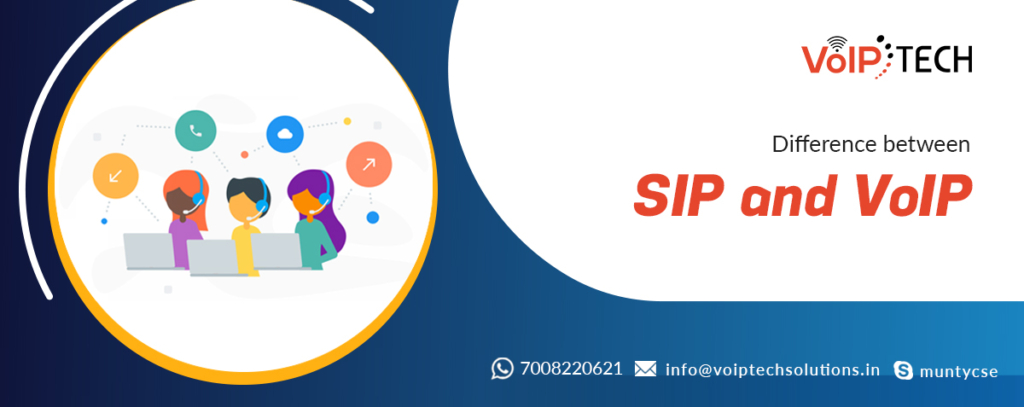Understanding the difference between SIP and VoIP will help you decide which is best for your company.
What are SIP and VoIP?
Understanding the difference between SIP and VoIP will help you decide which is best for your company. You might find that both are useful for your current and future business demands. A better understanding can aid you in determining which communications provider is best for your business.
VoIP stands for Voice over Internet Protocol, and it allows you to make and receive calls over the internet. SIP, on the other hand, is a protocol that allows for multiple VoIP calls to be made. It enables devices to communicate quickly and efficiently. SIP and VoIP both allow you to send and receive voice data from your computer or mobile device.
Although both SIP and VoIP are used to transmit data over the internet, they are not the same.
SIP can be considered one of the main technologies that allow VoIP calls to be made. Because these functions are becoming increasingly crucial in today’s workplace, many customers consider SIP to be an essential component of their VoIP system.
When all you need is voice communication, VoIP can work without SIP. However, if you want to use VoIP and enjoy multimedia communications, SIP technology is required.
As more businesses turn to the Internet for enterprise telephony advancements, the terms “SIP trunking” and “VoIP” are becoming more common. SIP and VoIP are terms that relate to phone connections that are made through the Internet rather than through traditional phone lines. Is SIP and VoIP, however, the same technology? Or are there distinctions that business leaders should be aware of?
What is SIP?
SIP is a protocol that provides data between two or more parties. The open-source communications protocol supports file sharing, text messaging, video conferencing, and other multimedia sessions in addition to voice. This is why so many of the apps we use in our daily lives use it as their preferred protocol.
SIP also allows you to connect to a traditional phone network, such as a landline or a mobile device, through SIP trunking. This is useful since it allows you to call any phone number, even if it isn’t connected to the internet. When used in conjunction with a VoIP system, it allows for a more flexible and user-friendly phone system.
Instead of using the public switched telephone network, VoIP uses data connectivity to transfer voice packets.
What is VoIP?
Users can call and receive voice calls over the internet using VoIP. In today’s world, VoIP is only a minor element of an app’s communication capabilities, which typically also include text messaging and video chat. In many circumstances, but not all, VoIP uses SIP.
You can call or receive calls with VoIP from a computer, a mobile device, or even a specialist VoIP phone. VoIP is a broad term that refers to any technology that allows you to exchange voice signals over the internet.
Benefits of both SIP and VoIP
There are several benefits to adopting SIP, which is why hosted VoIP providers rely on the cloud to supply phone services to their customers. Here are a few major benefits discussed.
Scalability
To commence with, both SIP and VoIP eliminate the need for PSTN innovation, allowing businesses to scale quickly without the cost or hassle of on-site hardware.
If you need to add extra lines or seats right away, setting up another SIP channel is significantly easier than setting up a real phone line. As a result, both businesses and contact centers can improve their estimation of their relationships as they prepare for surges in call volume and traffic.
Reduce the cost of communication
You won’t have to stress over costly, traditional correspondence hardware, such as Basic Rate Interfaces (BRIs) or Primary Rate Interfaces (PRIs), if you use SIP and VoIP administrations (PRIs). You won’t need a PBX on-site because many SIP providers will provide one for you.
Furthermore, calls made over SIP and VoIP are substantially less expensive than calls made over traditional phone lines. In this way, when you use SIP for VoIP, you’ll save money on hardware, maintenance, and even calling minutes.
Reliability
Although SIP and VoIP reliability is mostly dependent on their suppliers, it is also a key difference for each.
If your internet connection fails, most SIP providers offer a mobile fail-over option. In the event of a malfunction, rerouting calls to your employees’ mobile devices or other offices will ensure that you never lose contact with your clients.
SIP can also be used in conjunction with existing PRI lines to form a hybrid system with increased reliability.
While service quality differs among vendors, VoIP’s dependability is dependent on the stability of your internet connection. The quality and availability of your VoIP services will be harmed by a slow or inconsistent internet connection.
Coverage Across the Globe
SIP trunking enables you to take your company worldwide by letting you control and access it from any location with an Internet connection. This enables you to hire personnel in any place and serve consumers all around the world. SIP trunks can connect faraway business sites to increase your company’s geographic footprint by combining voice and data on a single network.
If you’re considering switching to Internet-based phone systems and are debating whether SIP or VoIP is the better technology, you’ve probably already made up your mind. However, there is no direct comparison between SIP and VoIP. The most important question is whether a voice-only VoIP phone service or a SIP deployment with Unified Communications capabilities is a better fit for your business size.
VoIP vs. UCaaS is a better comparison for many firms than VoIP vs. SIP. Budget and desire to use multimedia communications tools are two factors that may influence your decision on whether UCaaS is the perfect fit. If your company already uses collaborative tools or technologies that are part of Unified Communications, you may have a compelling case for adopting SIP.
Why “VoIPTech solutions”?
Both SIP and VoIP are essential tools in today’s workplace. While no single company can have a one-size-fits-all solution, the interlocking technologies that enable many of today’s best communication apps can. The SIP protocol, which powers VoIP technology, has made it easier than ever to communicate with colleagues, friends, and family all around the world. All you’ll need is a reliable high-speed internet connection, and the tech will handle the rest.
VoIPTech solutions provide the best VoIP solutions for both SIP and VoIP. Now it depends on you which is better for your organization. First compare, then choose what is best for you and your organization.







